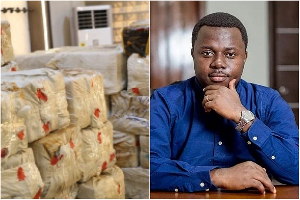One of the most beautiful things about our indigenous languages is that they often teach their best lessons through proverbs, not direct assertion.
And some of those proverbs are so profound that they take your breath away. Whether framed in metaphorical terms or presented as rhetorical questions, they demonstrate what one might call truth a priori. That means – truth that can be recognised at face value or immediately; self-evident truth, in other words.
Such a proverb formed the topic of the essay question in the Twi language examination, when I was writing my GCE “O” Levels. It stuck in my head and has remained there ever since. It was this:
Nn??mafo se tete aso?e w?nnso? h? bio;
Na d?n nti na muka nan abi?sa no,
Wommu biako nngu mma ennka abien p??
(Moderners say that the resting place of ancient times is no longer their resting-place. That being so, why don't they remove one of the three legs of the traditional kitchen stove so that only two would remain?)
I guessed that this question was set by the authority on the Twi language at that time – C A Akrofi of Akropong Akuapem. He had authored several books on the Twi language, including Twi Kasa Mmra (Twi Grammar) and a collection of short stories: Mmodenbo Bu Mmusu Abasa So.
(Endeavour Breaks Down The Power of Misfortune). One wonders why these excellent books have not been republished by the Ministry if Education. Does the neglect illustrate the fact that our local languages are no longer an important part of our education?
People of Akrofi's calibre were such great teachers that even when they were examining you, they were simultaneously teaching you: it wasn't enough for them to find out how much you knew already. I enjoyed writing that paper, because it was such an unexpected invitation to think.
I said the proverb stuck in my mind, and the reason is this: I have been wondering, in recent days, about where we got the new politics we have been practising from. If you read the articles on the Opinion Pages of Ghanaweb, especially Say It Loud, you will be shocked at the number of postings – usually lifted from the “rented press” in Ghana – that are entirely dedicated to the defamation of politicians. Hardly do you see an article discussing a policy issue that one of the parties has raised! Personal-attacks-personal-attacks-personal-attacks-attacks – nothing more!
The more empty-headed politicians, in their turn, realising that our extremely lazy media personnel prefer to use “news” items that amount to personal attacks, do not hesitate to turn everything into personal attacks. And so the evil feeds on itself. As Shakespeare would say, “As if increase of appetite had grown by what it fed on!”
The depths to which our media personnel have sunk were exposed for all to see recently when one radio journalist claimed that a very prominent politician had “threatened to kill” him! He boasted, among other things, that he had the “evidence”: the threats were stored on his phone!
At once, one asked: how could such a fellow become a radio presenter? You call yourself a journalist and a very prominent politician 'threatens to kill” you, and you wait until his party had formally boycotted your radio station for alleged bias before you remember that he had “threatened to kill”you?
As a journalist, who is supposed to “educate” the public, did you know that “threatening to kill” someone is a criminal offence? If you did not, then you are abysmally ignorant and the question to be asked is how could you possibly be a journalist? If you did, why did you not go and complain to the police but wait until now?
Secondly, if you are so daft that you could not pick on anyone else but a man who was a prominent lawyer before he entered politics to accuse of such crimes, then what qualifies you to be a journalist? As a journalist, you are supposed to exercise judgement about what to say or not to say.
If you could not analyse your own situation and reach the conclusion that it would sound strange for a very good lawyer to text threats to you which you could use as evidence to incriminate him; if you could not realise that a lawyer could abuse you one million times over, without using words that would break the law, then indeed, what sort of journalist are you?
Then, when you have done your worst and your father has joined you in your enterprise of politicallyinspired character assassination you meekly retract your false assertions and blithely apologise! And, of course, your professional association looks on and smiles to itself: the antagonists have smoked the peace pipe. All is well and good.
I started this article by invoking the past. Listen: this country experienced very dangerous social tension between 1954 and 1956. Some people lost their lives. But despite the violence, politics was still about issues. The National Liberation Movement (NLM) wanted Ghana to be governed under a federal system. The Convention People's Party wanted Ghana to continue to live under a unitary system of government. There were cogent arguments for and against each view. There were additional issues: for instance, the NLM also wanted the sale of cocoa to overseas buyers to be taken away from the Cocoa Marketing Board [i.e. the “predatory” government] and placed in the hands of the farmers themselves. The CPP wanted to retain the arbitrary system inherited from the British.
These were life and death issues and they were debated ad nauseam. But although within the NLM fold, there were people who had worked closely with Dr Kwame Nkrumah in the early years of the CPP, none of them turned the debate into a salacious discussion if personal foibles. For instance, Mr Joe Appiah was actually the former representative of Dr Kwame Nkrumah in London. Yet, he became an NLM kingpin. Imagine what some of our modern political operatives would do if they obtained sensitive, confidential information regarding the personal life of a leader from whom they later parted!
The question is: how come the children of that generation of fairly decent politicians have descended so low into the gutter today that their own parents would disown them if told of how they conduct politics? Suppose one of these wily old politicians were to ask any of the “communications” loud-mouths of today, “But what at all are the issues that separate you from the other party?” what would the answer be? “WE want to control the distribution of the national cake?”
Well, many of our ancients did not know what a cake was. But they knew what a pot containing fufuo or tuo was. And they would have told our propagandists this: “If you struggle too hard over a pot containing food, the pot may break and spill the food on the ground. And then, no-one can eat it!”
But would our propagandists even understand that proverb?
By the way, the reason why you can't break off any part of the old-style stove is that if you did so, it would deposit your food into the fire – pronto! Someone found that out – and left posterity with an excellent means of cooking food when you have nothing but clay to work with.
Opinions of Saturday, 9 April 2016
Columnist: Cameron Duodu














